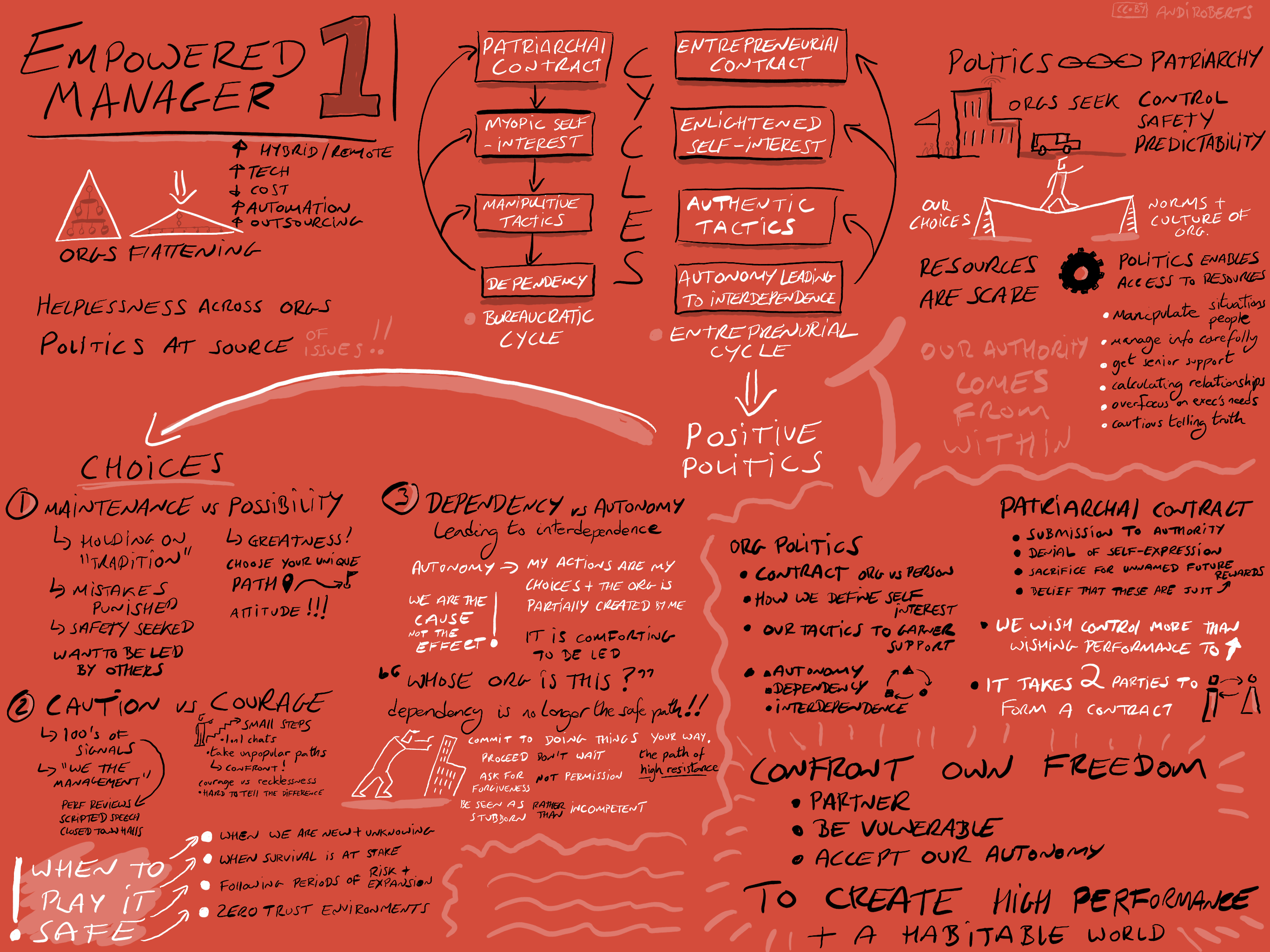The book in 3 sentences
The Empowered Manager is a practical guide for managers who want to lead with integrity, not control. It shows how managers can choose partnership over hierarchy, service over self-interest, and accountability over compliance. By making these personal shifts, managers can foster trust, ownership, and meaningful change, regardless of the system they work in.
Who should read The Empowered Manager
- Mid-level managers navigating bureaucratic or hierarchical systems
- Leaders seeking to foster ownership, trust, and participation
- Internal change agents frustrated with control-based cultures
- Anyone ready to shift from “doing their job” to owning their contribution
Top quotes from The Empowered Manager
“Look at each encounter as an opportunity to create the culture we want to inhabit…. Cultures get changed in a thousand small ways, not by dramatic announcements or change management programs coming from the top.”
Peter Block reminds managers that culture is not shaped by grand strategies or formal initiatives. It is shaped moment by moment, through how we show up in everyday interactions. Each conversation, meeting, or decision is a chance to model the values we want to see. If we want a culture of trust, we build it by trusting. If we want ownership, we invite participation. Managers don’t need permission to start this work. Cultural change begins locally, relationally, and incrementally—not from directives handed down, but from how we treat each other in the ordinary flow of work.
“It is the transformation of the culture of the room we are in that holds the possibility of transforming the culture of the rest of the organization. It is change from the inside out. The meeting I am a part of at this moment is a microcosm of the organization as a whole.”
Peter Block challenges the belief that organisational change must begin at the top or be rolled out system-wide. Instead, he argues that culture is local and immediate, it lives in the atmosphere of the rooms we are in right now. Every meeting is a small-scale version of the wider organisation. The way people speak, listen, make decisions, and relate to one another in that room reflects, and can reshape, the broader culture. Managers have the power to begin change at this level by modelling partnership, respect, and openness. Culture change doesn’t begin with policy; it begins with presence.
“Trust is almost universally built or destroyed on the basis of issues of mutuality and integrity. Mutuality means that there is validity in others’ positions, even though they may be opposed to ours. Integrity means that we keep our promises and operate aboveboard.”
In Peter Block’s view, trust is not built through charisma or authority, but through how we handle difference and how we follow through. Mutuality recognises that people can disagree with us and still have valid perspectives, a fundamental shift from win/lose mindsets. Integrity means being consistent, transparent, and reliable, doing what we say and being honest about what we can’t. Together, mutuality and integrity form the backbone of partnership. Without them, empowerment becomes rhetoric. With them, real collaboration becomes possible. Managers who want trust must live these values, not just talk about them.
“Empowerment may simply be a set of commitments we make to ourselves:
• We are the architects of our organizations, choosing their form and future. We are not just laborers, following another’s plans.
• We set goals that are unique and that no one else has achieved before in the same way.
• We choose the path of high resistance and live with the anxiety that creates.
• We risk all we have. Not for the thrill of it, but because there is no safe path.
• We may be nothing more than a possibility. And that may be enough.
• We are interdependent and relational creatures.
We do nothing alone and there are others with the same vision who are waiting for us right around the corner.”
Peter Block reframes empowerment not as something granted by others or enabled by policy, but as a personal stance—a set of inner commitments we choose to live by, regardless of circumstance. These commitments reflect a mindset shift from passive compliance to active authorship. When we see ourselves as architects, not labourers, we accept responsibility for shaping the systems we’re part of. We pursue meaningful goals that haven’t been done before, knowing this will require risk, discomfort, and uncertainty. Empowerment also means accepting our limitations—we may not have all the answers, but we act anyway. And crucially, we do so in relationship with others. Empowerment is not heroic individualism; it’s grounded in mutual support and shared vision.
Top takeaways from The Empowered Manager
-
Bureaucracies often disempower by design – Many organisations run on a patriarchal contract that breeds caution, compliance, and dependency. These environments discourage initiative and encourage manipulation as a survival tactic. Block calls for a shift to an entrepreneurial contract, one that invites autonomy, mutual accountability, and enlightened self-interest. The goal is to replace control with commitment and hierarchy with partnership.
-
Escape the traps of fear and maintenance – Patriarchal systems keep people stuck in maintenance mode, protecting what is, rather than creating what could be. Block encourages managers to reject the false safety of dependency and instead choose courage, possibility, and ownership. It is in choosing autonomy, despite risk, that we become truly empowered.
-
Empowerment is personal before it is structural – Empowerment is not something handed down. It begins with a mindset: seeing ourselves as agents of change regardless of role. Even those at the top operate under constraints. True power comes not from position but from the willingness to act with integrity and to trust others in the process.
-
Purpose and interdependence drive authentic power – Empowered managers are driven by a personal purpose, not just performance metrics. They commit to acting on what matters, while recognising they cannot succeed alone. Empowerment requires connection—not just autonomy. Interdependence is the foundation of resilient leadership.
-
Engagement requires focus and courage – To build commitment in others, managers must be relentless in inviting ownership. This means focusing on what matters, resisting distractions, confronting passive behaviours, and naming what is possible, not just what is acceptable. Empowered leadership lives in the conversations we choose to have.
-
Reject manipulation in favour of honesty – In disempowered cultures, manipulation becomes a tool for getting things done. Peter Block urges managers to stop repositioning truth to make it palatable. Instead, say no when you mean no. Share what is real. Use language that respects people’s intelligence. Trust is built on candour, not convenience.
-
Craft a bold and compelling vision – Empowerment requires a clear sense of where we’re going. A strong vision is not a practical checklist, it’s a declaration of possibility. It begins with what you want to offer others (customers or colleagues), not what’s easy to achieve. The act of co-creating vision builds momentum and belief.
- Partnership starts with trust and alignment – To act effectively with others, we must understand their level of agreement and trust. Block suggests mapping stakeholders across these two axes to guide strategy. Successful partnerships begin with mutual clarity of goals and trust—both of which must be discussed and negotiated.
 9) You have political agency, use it consciously – Organisational politics are unavoidable. What matters is how we participate. Block outlines eight scripts we often fall into (like pleasing, rescuing, withdrawing, or being overly rational). Empowered managers engage with politics constructively, by naming what they want, expressing emotion, and staying true to purpose, rather than manipulating outcomes.
9) You have political agency, use it consciously – Organisational politics are unavoidable. What matters is how we participate. Block outlines eight scripts we often fall into (like pleasing, rescuing, withdrawing, or being overly rational). Empowered managers engage with politics constructively, by naming what they want, expressing emotion, and staying true to purpose, rather than manipulating outcomes.
Five things you could do this week
- Name your real accountabilities, not just your job description: Write down what you are truly committed to—not what’s on the org chart, but what you choose to be responsible for. Ask yourself, “What results matter most to me, regardless of whether anyone is watching?” This is your authentic contract.
- Turn one top-down moment into a partnership: In your next meeting or task where you’d usually direct or decide, pause. Ask others, “What do you see? What do you want to take ownership of?” Replace compliance with collaboration. Invite others to step into power with you.
- Act without waiting for permission: Notice where you’re holding back, waiting for authority, clarity, or sign-off. Pick one place to move forward based on your judgement and values. Empowerment begins when you claim your freedom to act.
- Transform a complaint into a personal commitment: Take a recurring frustration and flip it: “What am I willing to take responsibility for here?” Instead of waiting for others to change, choose the smallest shift you can own. This is the first act of empowerment.
- Name the truth that others avoid, with respect and purpose: Identify one conversation where something important is left unsaid. Speak up, not to criticise or challenge power, but to serve the system. Truth spoken with care is a radical act of stewardship.
Connected readings
Stewardship: The Empowered Manager is deeply aligned with Stewardship, expanding the idea of service-based leadership into everyday managerial roles. Both books reject control in favour of responsibility and shared ownership.
Flawless Consulting: Where Empowered Manager addresses internal leadership, Flawless Consulting focuses on external influence. Both offer practical tools for engaging others through trust, dialogue, and mutual accountability.
The Answer to How Is Yes: This book lays the personal foundation for empowerment, challenging readers to stop asking how and start declaring what matters. The Empowered Manager builds on this by applying it to managerial life.
Community: The Structure of Belonging: While focused on civic spaces, Community echoes the same themes: relational leadership, small group accountability, and the power of asking different questions.
Activating the Common Good: Broadening the reach of empowerment into public life, this book shows how ordinary people create change through belief, conversation, and shared responsibility—mirroring many principles of empowered management.
All my curated Peter Block content is now available on the Peter Block Resources hub page.
Quick visual Notes for The Empowered Manager
There are the notes I created as I read the book. Often done on trains, plains and automobiles



Connection to my work:
As a leadership coach, facilitator and executive educator the book resonates with me as it discusses how to rewire organisations through collaboration and empowerment. I run, in partnership with a global team from Peter’s company, Design Learning “Building Trusting Relationships” and “empowered at work”, which are based around this book, as well as “Flawless Consulting”.





[…] to do and be. From an organisational perspective, I would also add in “The empowered manager” (summary) for leaders looking to take more of a stewardship stance in their organisation. Click HERE to buy […]
[…] Empowered Manager – Where Flawless Consulting is about client work, The Empowered Manager applies the same mindset to internal leadership. Both focus on partnership, authenticity, and […]
[…] Previous Next […]
[…] Previous Next […]
[…] Empowered Manager – Where Flawless Consulting is about client work, The Empowered Manager applies the same mindset to internal leadership. Both focus on partnership, authenticity, and […]
[…] The empowered manager: A hands-on complement to Stewardship, this book brings the ideas of service, responsibility, and ownership into the daily decisions of managers working within traditional structures. It offers practical guidance for shifting from control to partnership inside organisations. […]